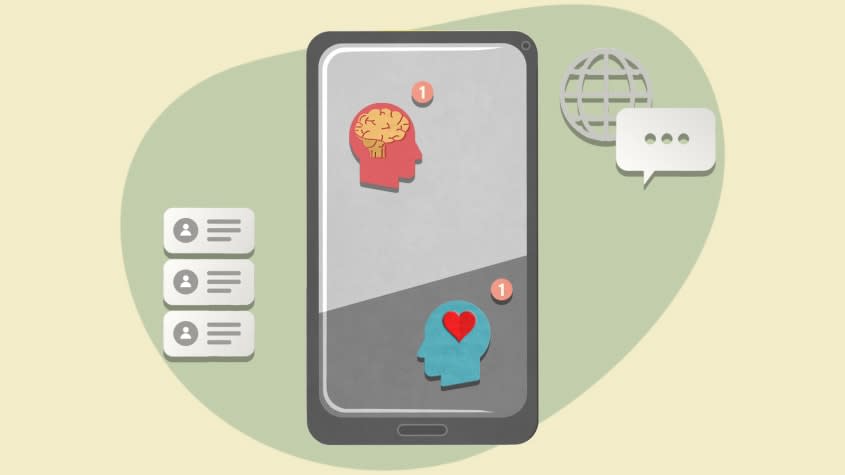The benefits and drawbacks of mental health apps

Accessing quality mental health care can be challenging. Some people find it too expensive, especially if they lack insurance coverage. Others reside in areas where mental health professionals and therapists are scarce. Enter mental health and therapy apps, which have been around for years but have grown in both number and popularity lately, especially during the Covid-19 pandemic.
Today, thousands of mental health and wellness apps claim to help people with anxiety, depression and other mental health conditions. While people seem receptive to using these apps to seek help, others point out there's reason to be wary of their promises. Some apps offer digital support from licensed professionals, but many offer a completely humanless experience. Though they can provide an alternative, it's unclear whether they can match the benefits of seeking help from a real-life professional.
Pro: Make mental health care more accessible
Mental health apps have the potential to assist people who usually couldn't access mental health care to recognize and manage symptoms of mental illness, reported Popular Science. Jason Moehringer, the co-founder of PsyberGuide, a website that provides evidence-based reviews of so-called mHealth apps, believes they're a "huge benefit at a time when mental health care is virtually unobtainable for around half of Americans living with mental illness," according to Popular Science. The apps can "provide many things that traditional therapy often cannot," as they are "usually cheaper, and they don't require a commute to an office."
The "great potential of smartphones is the ubiquity of the device," Jukka-Pekka Onnela, the co-director of the Master of Science in Health Data Science program at the Harvard T.H. Chan School of Public Health, told The Harvard Gazette. In terms of "health inequities, if we can leverage devices that people already have, then we can potentially reduce those inequities," Onnela added.
Con: Offer little oversight or regulation
There isn't a regulatory body vetting the claims made by mHealth apps, so people interested in them are somewhat left to "navigate an explosion of options that range from expert-recommended to potentially harmful," Popular Science noted. Some apps use user testimonials or company-funded studies to support their ambitious claims. "Many claims are made that may or may not accurately reflect what these products actually offer," Moehringer told the outlet. "It's the wild west."
Most mental health apps lack peer-reviewed research to prove their efficacy, and it's unlikely that every one of these apps will go through a randomized clinical research trial to test its effectiveness, the National Institute of Mental Health (NIMH) stated. One reason is that the technology evolves too quickly for the slow testing process. "By the time an app has been put through rigorous scientific testing, the original technology may be outdated," per the NIMH.
Pro: Open people's minds to psychiatric care
While mental health has become more mainstream, as evidenced by the flurry of available mHealth apps, psychological health is still stigmatized. Experimenting with mental health apps can help persuade more people to seek help. "It can provide such a great foot in the door," Colleen Stiles-Shields, a professor of psychiatry at Rush University Medical Center, told Popular Science. A mobile app could be an "easy and discreet first step."
Con: Lack crucial human interaction
While some apps can connect users to a licensed therapist, "most provide a fully automated service that bypasses the human element," a trio of experts from the University of Melbourne wrote for The Conversation. Mental health apps are not "subject to the same standards of care and confidentiality as a registered mental health professional," the experts added. Some of them weren't even designed by "mental health professionals."
While existing research suggests some benefits for the apps, the relationship between patients and therapists remains critical for overall effectiveness, Simon B. Goldberg, an assistant professor at the Department of Counseling Psychology at the University of Wisconsin–Madison, told Psych Central. People "simply respond more strongly to interpersonal influences from live humans rather than fully or partially automated technology," Goldberg said. "Human-to-human connection is particularly powerful, especially when struggling with mental health issues."
Pro: Complement in-person therapy
Mental health apps may not be enough to replace the need for actual professional intervention. But they can still "complement therapy through symptom trackers, reminders, reinforcement of skills, and community features to set goals and share progress," Stephanie Collier wrote for Harvard Health Publishing.
Con: Present privacy and data concerns
Considering how much personal data can be collected by these apps, privacy concerns are one of their main drawbacks. The apps are subject to "standard consumer protection and privacy laws," the University of Melbourne team noted in The Conversation. In an analysis of the data protection and cybersecurity practices of mHealth apps, digital research nonprofit Mozilla found that most of them rank poorly. Popular mindfulness app Headspace collects data about its users from multiple sources and uses it to advertise to them. Some chatbot-based apps also "commonly repurpose conversations to predict users' moods and use anonymized user data" to train their systems, the Melbourne team explained. Many apps "share so-called anonymized data with third parties, such as employers, that sponsor their use."
